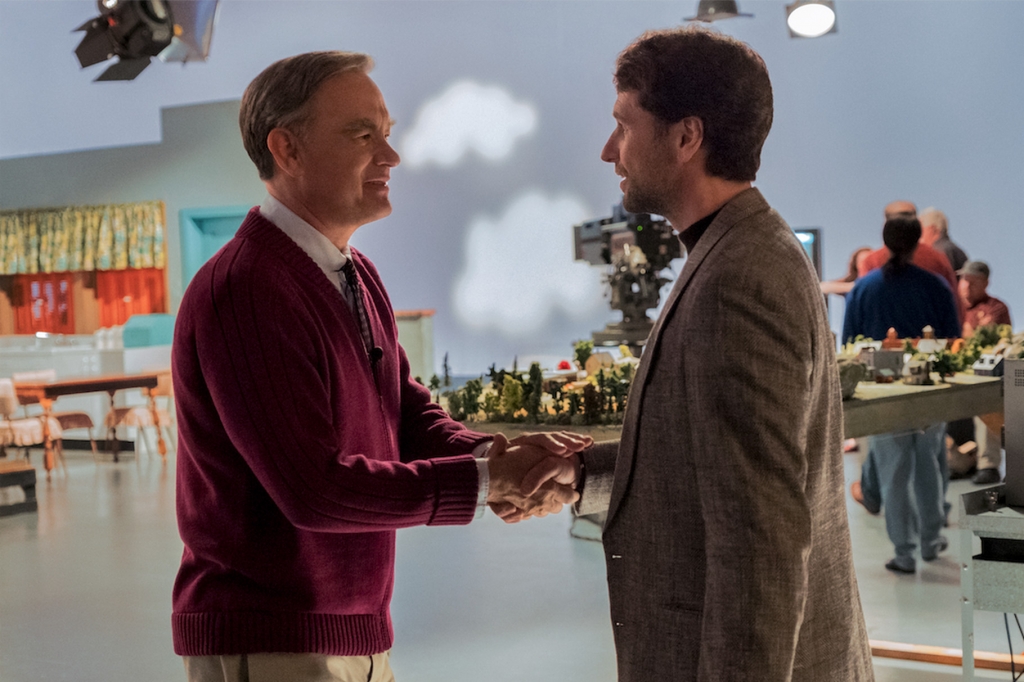“Hello neighbor.”
The first things we see and hear in A Beautiful Day in the Neighborhood should strike all the right pangs of familiarity. Set to the gentle, calming tinkles on a piano, we see the grainy film images of the red house, then the street, then the yellow blinking streetlight, then the door, and out the door comes…Mr. Rogers. Yes, he’s being played by another person––a different icon of American kindness––but somehow we know it’s HIM. It’s not just the mannerisms––the zipper that goes all the way up and then comes down a little, the bit with the shoe––but something more fundamental.
It’s not just Tom Hanks that has the tenor of the man down; it feels as though all of A Beautiful Day in the Neighborhood exists on the wavelength of Fred Rogers’ quiet heroism. It’s patient, calm, honest, and open. It’s tempting to describe these qualities as “saintly,” but, as we’re told, Mr. Rogers doesn’t like that word. It puts him on a level of unattainability, and that won’t do. We all have it within ourselves to be Mr. Rogers. We’re all human.
That’s the hard lesson Lloyd Vogel learns over the course of the movie, because this isn’t actually a story about Mr. Rogers. Rather, it’s about just one of the many, many people he saved. “Someone has hurt Lloyd,” Mr. Rogers tells us in the beginning, and we see that hurt has transformed him into a cynical man; not a monster, or an unrealistically cruel person, but a man who perhaps understandably scoffs at the idea that Fred Rogers and “Mr. Rogers” are actually one and the same.
But they are. They are, and soon Lloyd finds himself on the receiving end of Mr. Rogers pure, unfiltered empathy, and it’s almost too much for him to take. There’s some potential tension towards the beginning, especially in the early interview scenes, where Vogel’s hard-hitting interview style clashes with Rogers’ almost infuriating kindness. Matthew Rhys plays this tricky role with extraordinary precision, hitting all the right notes to ensure that we sympathize with him and long for his salvation (well, I say “extraordinary,” though anyone familiar with his stellar work on The Americans knew long ago just what he was capable of).
It sounds strange to say, considering that he’s widely considered to be one of the all-time great American actors, but Tom Hanks isn’t the man I would immediately think of when asked who should play Mr. Rogers. He’s very much of a type, and while it’s reductive to say that “he always plays Tom Hanks” – he doesn’t – it’s true that he does have a persona that usually shines through no matter what he’s doing.
What Marielle Heller manages to do is channel Hanks’ inner goodness into a performance that evokes Fred Rogers more than it tries to imitate him. Heller, fresh off of another quietly affecting biopic (Can You Ever Forgive Me?) is directs the thing with clipped restraint, content to mostly stay out of the story’s way.
“You love broken people,” he says. “Like me.” You might remember that line from the trailer. What’s not included is Mr. Rogers’ response: “I don’t think you’re broken.” What follows is the definitive scene of the movie, where Mr. Rogers asks Lloyd to join him in thinking about the people who loved him into who he is today. Lloyd agrees, and the restaurant where they’re eating goes quiet. And as the camera slowly zooms in on Tom Hanks’ face, we realize that the movie is inviting us to do the same. So we stop. And we think.

